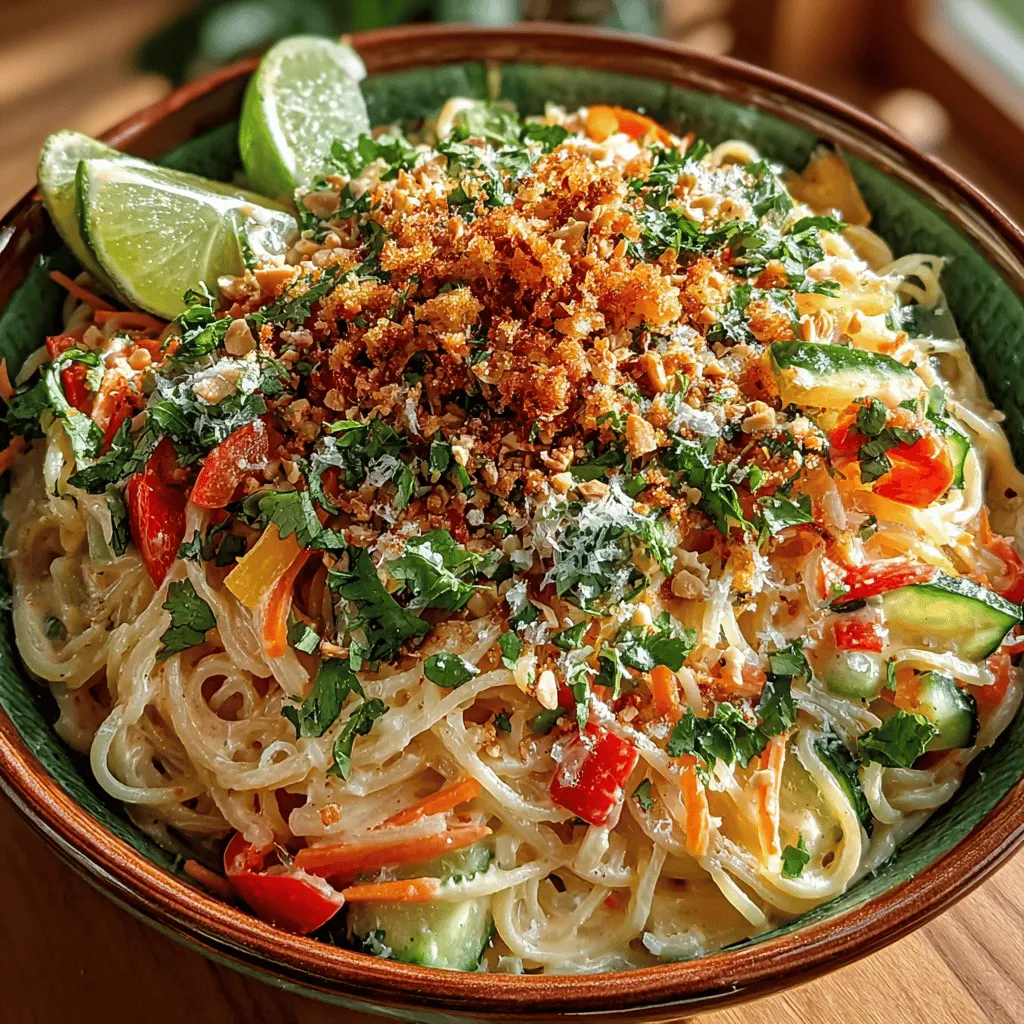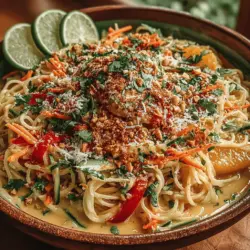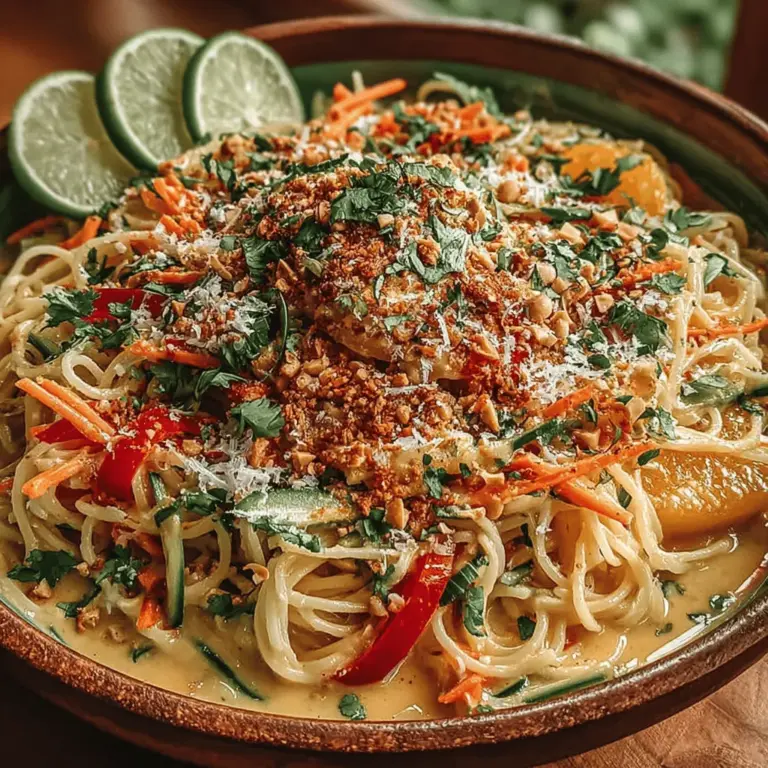Chilled Thai Peanut Noodles: A Refreshing and Flavorful Delight
Chilled Thai Peanut Noodles are a culinary gem that encapsulates the vibrant flavors of Thai cuisine while offering a refreshing twist perfect for a variety of occasions. This dish is a celebration of textures and tastes, combining the delightful chewiness of rice noodles with a creamy, nutty peanut sauce and a medley of crisp vegetables. Whether you’re planning a summer picnic, seeking a quick weeknight dinner solution, or preparing meals for busy days ahead, this recipe stands out for its versatility and appeal.
The origins of Thai peanut noodles can be traced back to the rich tapestry of Thai street food, where bold flavors and fresh ingredients come together to create satisfying meals. This dish is beloved for its ability to be served cold, making it a perfect choice for hot weather or anytime you crave a light yet fulfilling meal. The combination of wholesome ingredients not only provides a burst of flavor but also ensures a nutritious dining experience that can be enjoyed by everyone, from families to health-conscious individuals.
Understanding the Key Ingredients
To appreciate the brilliance of Chilled Thai Peanut Noodles, it’s essential to understand the role each ingredient plays in creating this delightful dish.
Rice Noodles
At the heart of this recipe are rice noodles, which are a staple in Thai cuisine. Known for their delicate texture and neutral flavor, rice noodles serve as the perfect canvas for the vibrant peanut sauce and fresh vegetables. When cooked properly, they offer a satisfying chewiness that enhances the overall eating experience. For those with dietary restrictions, alternatives to traditional rice noodles are readily available. Gluten-free options such as quinoa or soba noodles can be used, and whole grain varieties offer added nutritional benefits without sacrificing flavor.
Creamy Peanut Butter
No dish would be complete without its key flavor components, and creamy peanut butter is the star of this recipe. Beyond its rich and nutty taste, peanut butter is packed with healthy fats, protein, and essential vitamins, making it a nutritious addition to any meal. The creaminess of the peanut butter is crucial in creating a luscious sauce that clings to the noodles and vegetables, enhancing each bite with its depth of flavor. For those looking to switch things up, natural almond or cashew butter can serve as excellent substitutions, offering unique flavors while maintaining the dish’s integrity.
Sauces and Seasonings
The magic of Chilled Thai Peanut Noodles lies in the harmonious balance of sauces and seasonings that come together to create a flavor explosion. A combination of soy sauce, rice vinegar, honey (or maple syrup), and sriracha brings a complex mix of sweet, salty, and spicy notes to the dish. Soy sauce provides a savory depth, while rice vinegar adds a tangy brightness that cuts through the richness of the peanut sauce. The sweetness from honey or maple syrup complements the other flavors, and a splash of sriracha introduces a delightful kick, appealing to those who enjoy a hint of heat in their meals.
Fresh Vegetables
To elevate the dish further, fresh vegetables play a pivotal role in adding crunch, color, and nutritional value. Ingredients such as red bell pepper, shredded carrots, and cucumber not only contribute to the dish’s visual appeal but also provide essential vitamins and minerals. The addition of fresh herbs like cilantro and green onions enhances the freshness of the dish, making each bite a refreshing experience. These vegetables can be tailored to personal preferences or seasonal availability, ensuring that the dish remains adaptable and exciting.
Step-by-Step Preparation Guide
Now that we have a clear understanding of the ingredients that contribute to the delightful Chilled Thai Peanut Noodles, let’s delve into the preparation process. This step-by-step guide will ensure that even novice cooks can create this flavorful dish with ease.
Cooking the Rice Noodles
The first step in preparing Chilled Thai Peanut Noodles is cooking the rice noodles. Begin by bringing a large pot of water to a rolling boil. Once boiling, add the rice noodles, stirring gently to prevent them from sticking. It’s essential to follow the package instructions regarding cooking time, typically around 4 to 6 minutes, but keep a close eye on them to avoid overcooking. The goal is to achieve a tender yet firm texture, known as “al dente.” Once cooked, immediately drain the noodles and rinse them under cold water to halt the cooking process. This step not only cools the noodles but also helps to remove excess starch, ensuring they remain separate and don’t clump together.
Crafting the Perfect Peanut Sauce
While the noodles are cooling, it’s time to prepare the star of the dish: the peanut sauce. In a mixing bowl, combine creamy peanut butter with soy sauce, rice vinegar, honey (or maple syrup), and sriracha. Using a whisk or fork, blend the ingredients until smooth. The consistency of the sauce can be adjusted by adding a splash of warm water, allowing it to reach your desired thickness. Taste the sauce and feel free to adjust the flavors according to your preference—more honey for sweetness, additional sriracha for heat, or a splash more soy sauce for added saltiness. The goal is to create a sauce that is rich, creamy, and bursting with flavor.
Vegetable Preparation Techniques
With the noodles cooked and the sauce ready, it’s time to prepare the fresh vegetables. Start by washing and drying your vegetables thoroughly. For the red bell pepper, slice it thinly to enhance its sweetness and crunch. Shredding the carrots not only adds a pop of color but also makes them easier to incorporate into the dish. The cucumber should be sliced into thin matchsticks or rounds, providing a refreshing crunch that complements the other ingredients. Finally, chop the fresh herbs—cilantro and green onions—finely to release their aromatic flavors. These vibrant additions will not only enhance the visual appeal of the dish but also contribute essential nutrients, making your meal wholesome and satisfying.
With the key components prepared, you are now ready to assemble the dish, combining the noodles with the creamy peanut sauce and vibrant vegetables to create a tantalizing meal that is sure to impress. As we continue in the next part, we will explore the final assembly and presentation of Chilled Thai Peanut Noodles, along with tips for serving and storing this delightful dish.

Best Practices for Slicing and Preparing Vegetables
When it comes to preparing your vegetables for Chilled Thai Peanut Noodles, presentation and texture play significant roles in enhancing the overall dining experience. Here are some best practices for slicing and preparing your vegetables:
Julienning Vegetables
Julienning is a technique where vegetables are cut into thin, matchstick-like strips. This method not only helps in creating a visually appealing dish but also ensures that each bite is packed with flavor. To julienne:
1. Select Fresh Vegetables: Choose firm and fresh vegetables such as carrots, cucumbers, and bell peppers for the best results.
2. Wash and Peel: Rinse your vegetables thoroughly and peel them if necessary. For carrots, a simple wash and peel will suffice, while cucumbers can be left unpeeled for added texture and nutrients.
3. Cut into Planks: Start by cutting the vegetable into even planks (about 1/4 inch thick).
4. Slice into Strips: Next, stack the planks and cut them into thin strips. Aim for uniformity in size for even cooking and an appealing presentation.
Shredding Vegetables
Shredding is another effective technique, especially for leafy greens or softer vegetables. Shredded cabbage, for example, adds a nice crunch and a pop of color. To shred:
1. Use a Box Grater or Food Processor: For quicker preparation, you can use a box grater for a coarser shred or a food processor for a finer shred.
2. Cut into Smaller Pieces: If using a knife, slice the vegetable into smaller sections before shredding to manage them better.
3. Keep It Fresh: Shredded vegetables can oxidize quickly, so if you’re preparing them ahead of time, store them in an airtight container with a damp paper towel to maintain crispness.
By employing these techniques, your chilled noodle dish will not only taste delicious but also look enticing, drawing in your guests with vibrant colors and textures.
Combining and Chilling
Once your vegetables are sliced and prepped, it’s time to combine them with the noodles and sauce. This step is crucial for developing the dish’s full flavor profile. Here’s how to do it:
1. Cook the Noodles: Begin by cooking your noodles according to the package instructions. Once cooked, drain and rinse under cold water to stop the cooking process. This step ensures the noodles are chilled and ready to mix with the other ingredients.
2. Mix the Sauce: In a separate bowl, whisk together your prepared peanut sauce until smooth. Adjust the consistency with a little water, if necessary, to ensure it coats the noodles evenly.
3. Combine Ingredients: In a large mixing bowl, combine the cooled noodles, julienned vegetables, and the peanut sauce. Toss gently but thoroughly to ensure every strand of noodle and piece of vegetable is coated in the luscious sauce.
4. Chill: Cover the bowl with plastic wrap or transfer the mixture into an airtight container. Place it in the refrigerator for at least 30 minutes to allow the flavors to meld beautifully. This chilling time is essential as it enhances the taste and creates a refreshing dish perfect for hot days.
Serving Suggestions and Presentation
Chilled Thai Peanut Noodles can be served in various ways, making them versatile for any occasion, whether it’s a casual lunch or an elegant dinner party.
Garnishing Ideas
Garnishing your dish not only adds flavor but elevates its visual appeal. Consider the following garnishing options:
– Crushed Peanuts: Sprinkle crushed peanuts over the top for an added crunch and nutty flavor. They also provide a beautiful contrast against the colorful vegetables.
– Fresh Herbs: Fresh cilantro, mint, or basil can add a burst of freshness. Chop them finely and scatter them over the dish before serving.
– Lime Wedges: Serve lime wedges on the side. A squeeze of fresh lime juice right before eating enhances the flavors and adds a zesty kick.
Accompaniments
To enhance the overall dining experience, consider pairing your Chilled Thai Peanut Noodles with complementary side dishes or beverages:
– Spring Rolls: Fresh or fried spring rolls filled with vegetables or shrimp make a great appetizer that pairs well with the noodles.
– Asian Slaw: A refreshing Asian slaw with a sesame dressing provides a crunchy contrast to the noodles.
– Iced Tea or Coconut Water: For beverages, serve iced Thai tea or coconut water, which perfectly complements the flavors of the dish while keeping things light and refreshing.
Nutritional Benefits of Chilled Thai Peanut Noodles
Chilled Thai Peanut Noodles not only satisfy your taste buds but also offer several health benefits, making them a balanced meal option.
Balanced Meal Profile
This dish presents a well-rounded profile of macronutrients:
– Carbohydrates: The noodles provide a good source of carbohydrates, supplying energy for your day.
– Healthy Fats: Peanut sauce is rich in healthy fats, primarily from peanuts, which can help with satiety and nutrient absorption.
– Protein: If you choose to add tofu, edamame, or chicken, you can easily increase the protein content, which is essential for muscle repair and growth.
Vitamins and Minerals
The vegetables in this dish contribute a variety of vitamins and minerals:
– Carrots: High in vitamin A, which is vital for eye health and immune function.
– Bell Peppers: Rich in vitamin C, which boosts the immune system and helps in the absorption of iron.
– Cucumbers: Provide hydration and are low in calories, making them an excellent addition to any meal.
Customization for Dietary Needs
Chilled Thai Peanut Noodles can easily be adapted to meet various dietary requirements:
– Vegan Option: Simply use a plant-based peanut sauce and skip any animal proteins. Tofu or chickpeas can be great protein substitutes.
– Low-Carb Alternative: For those on a low-carb diet, substitute traditional noodles with zucchini noodles or shirataki noodles, which are lower in calories and carbs.
– Allergy-Friendly: If you have peanut allergies, consider using sunflower seed butter or almond butter instead of peanut butter for the sauce.
Conclusion
Chilled Thai Peanut Noodles are not just a meal; they are an experience that brings together the joys of cooking and sharing food with others. With their vibrant colors, delightful textures, and a burst of flavor, this dish is perfect for various occasions, from casual weeknight dinners to festive gatherings.
The convenience of preparing this dish ahead of time and letting it chill makes it an excellent choice for busy schedules. It’s a wholesome option that provides a balance of carbohydrates, healthy fats, and proteins, alongside a plethora of vitamins and minerals from fresh vegetables.
As you embrace this recipe, let it become a staple in your meal planning. Celebrate the joy of cooking by inviting friends and family over to share in this delicious experience. Whether enjoyed on a hot summer day or as a quick weeknight meal, Chilled Thai Peanut Noodles are sure to impress and satisfy. So gather your ingredients, follow the steps, and enjoy a delightful journey into the world of flavors that this dish offers!

